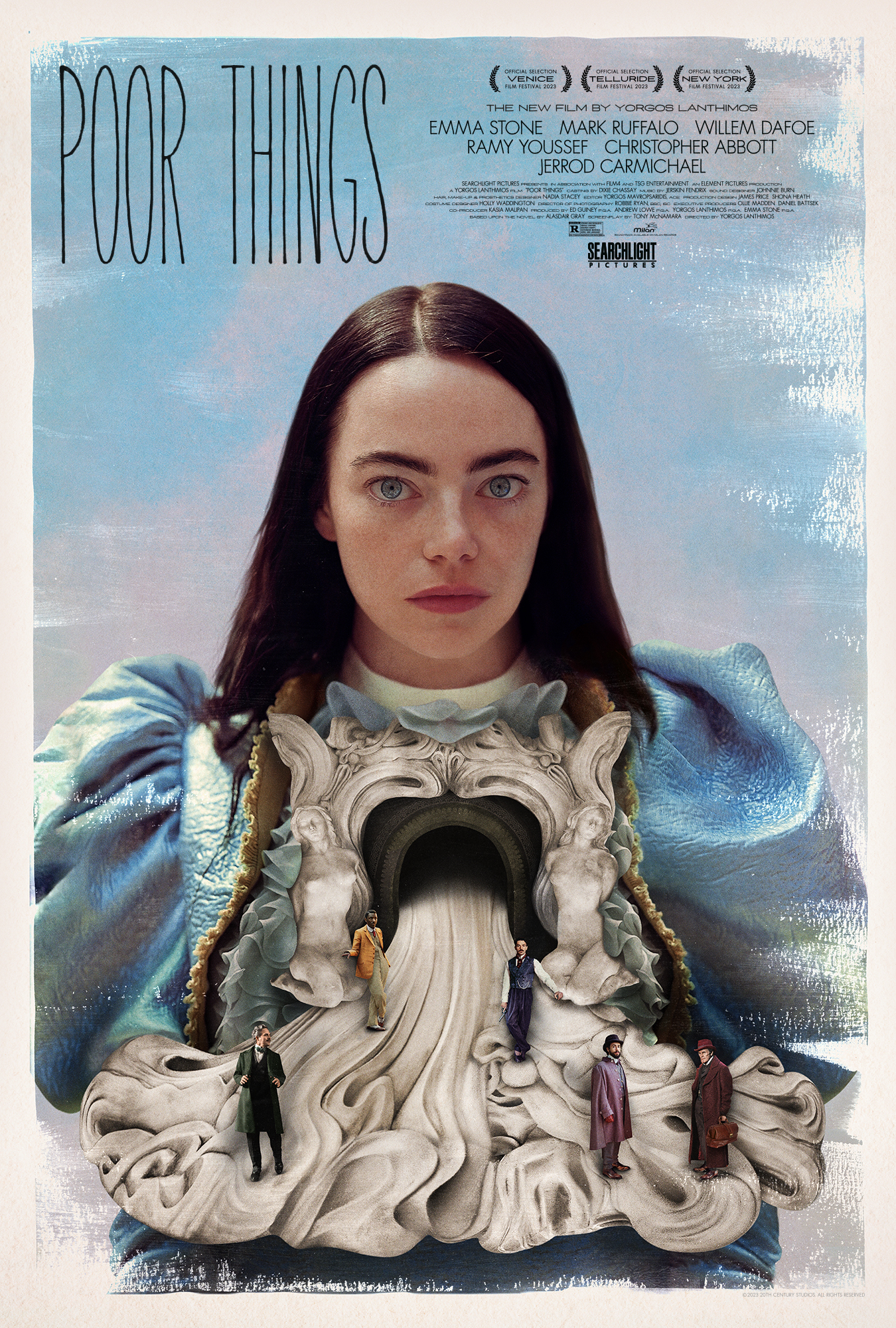
Content Warning: This article contains descriptions of bodily harm and violence.
Filleted brains, flayed cadavers, engorged abdominal tumors and a parade of sexual exploits whose encyclopedic variety puts the Kama Sutra to shame are only the tip of the unsettling iceberg that is Poor Things. And yet, if you can stomach its unabashed, almost childish debauchery, director Yorgos Lanthimos’ screen adaptation of Alasdair Gray’s eponymous novel will reward you with a compelling portrait of womanhood and a brilliantly orchestrated allegory of self-invention.
Lanthimos doesn’t waste too much time in revealing the movie’s premise: mad scientist Dr. Godwin Baxter (Willem Dafoe) has salvaged the body of an anonymous pregnant woman (Emma Stone) from the Thames and chosen to reanimate her body, having—out of experimental curiosity—replaced her brain with that of her unborn child. He names the woman-child Bella and raises her as his daughter, sheltering her from the outside world and the truth of her own genesis with the help of assistant Max McCandles (Ramy Youssef). Eventually, Bella becomes eager to explore the world, and embarks on an odyssey across the Mediterranean, discovering that the world and her past are not what she thought they were.
Poor Things’ writing is a bit of a mixed bag. The overarching metaphor of giving birth to oneself implicit in the character of Bella Baxter is undoubtedly clever. The stitched-together face of Bella’s creator Godwin, whom she affectionately refers to as “God,” turns the obvious allusion to Frankenstein’s monster on its head, further blurring the line between creator and creation. Lanthimos urges us to ask: who is the monster? Is the ultimate creator, God himself, simply cobbled together from bits and pieces of our collective imagination?
The biblical parallels in Poor Things extend beyond the “God” moniker. The character of Godwin is really a kind of divine trinity composed of Godwin as father to Bella, Godwin as son to a ruthless scientist, and the spirit of scientific progress—an Enlightenment twist on the “holy spirit.” The mechanical horse that drives Godwin’s coach is a perfect example of this reversal: Godwin creates life using his intellect. Godwin’s mansion serves as an alternative Eden, a paradise where anything is possible by virtue of science, not divine power. This difference is key to grasping the larger allegory at work: Godwin allows Bella, our alternative Eve, to indulge her sexuality, sending her forth with his blessing because of his commitment to intellectual freedom. The contrast between Bella’s happily-ever-after upon returning to Godwin’s mansion and Eve’s permanent banishment from Eden amounts to a sharp critique of Judeo-Christian morality.
When examined on a more granular level, the quality of the script deteriorates. Bella’s idiosyncratic speech patterns, presumably meant to capture the innocence of a young mind attempting to engage with an adult world, often come off disingenuous and even grated on my nerves by the end. The self-proclaimed “cynic” Lord Astley (Jerrod Carmichael), whose insistence on “knowing the world” is responsible for Bella’s Marxist awakening, is so disgustingly contrived that it almost breaks Lanthimos’ spell. The brief appearance of Bella’s husband, the possessive and homicidal Alfie Blessington (Christopher Abbot), similarly resides in the uncanny valley: too overstated to be genuine, but not so over-the-top as to be funny. Admittedly, it is sometimes hard to tell apart bad acting from bad writing, for only Stone and Dafoe offer convincing performances, with Ruffalo, Youssef and the rest being a weird jumble of accents and melodrama.
Any shortcomings of the script are redeemed twice over by Lanthimos’ cinematographic wizardry and surrealist humor. Though Bella Baxter’s eventual disillusionment with her dashing suitor Duncan Wedderburn (Mark Ruffalo) and the sex industry is predictable, the innovative reimagining of Lisbon, Alexandria, and Paris as colorful, life-size dollhouses kept my eyes glued to the screen. CGI-generated dog-chickens, goose-dogs and other chimeras roam the grounds of Godwin’s spacious London residence. As he eats, Godwin regurgitates a bubble of gastric effluence that hovers dramatically over the dinner table for a few seconds until it pops. At one point, one of Bella’s particularly unsavory johns during her time at the brothel scurries back and forth over the floor on all fours like a demonic crab. Suffice it to say, there’s never a dull moment in Poor Things.
Even the unrelenting stream of sex and violence is thoughtfully stylized: Lanthimos uses stark lighting and high contrasts in observance of the general dictum “make everything as uncomfortable as humanly possible.” This approach is a Lanthimos trademark, and here it serves a very important structural purpose, namely, stressing the carnal, utterly subliminal nature of these instincts. The constant discomfort we feel as audience members informs us that something is wrong with Godwin’s Eden, it alerts us to the fact that something is missing, and that something is morality. Though Godwin may be perfectly content with Bella remaining in his house forever, Bella actually needs to leave the house in order to become worthy of it once again. Only after experiencing the reality of untrammeled sex and violence firsthand does she learn to sublimate them into the rational pursuit of science (surgery, in particular), to “carve with compassion,” as Godwin advises her.
Perhaps my favorite thing about Poor Things is how hard it is to know where Lanthimos really stands. Despite the intricate metaphorical layering, you never lose the sense that everything you see is tongue-in-cheek. There is, after all, something that reeks of privilege in all of Poor Things—a movie which, from a bird’s-eye view, is about a wealthy white woman sampling the lower-class life and dallying in socialism before returning to her life of luxury. While it would be wrong to say Lanthimos doesn’t paint a sympathetic portrait of Bella, the biting undercurrent of mockery is the special sauce that makes Poor Things, for all its flaws, a cinematic gem.